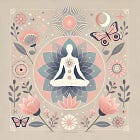A counter-intuitive take on passion from Epictetus
Why chasing passion might be overrated—and how an ancient Stoic's advice can help you live with more freedom and peace.
In my journaling escapades I recently tripped over an interesting question, cited from Epictetus.
What am I lacking in attaining freedom from passion?
- Epictetus, Discourses, 4.6.34-35
When I first read this question from Epictetus, I’ll admit, I was stumped.
I mean, come on. We live in a world where every other Instagram post screams, “Find your passion!” or “Pursue your purpose!” Passion is marketed to us like the ultimate life hack, the secret sauce for success and happiness.
So why on earth would anyone want to be free from it? Isn’t that like trying to live without oxygen (or Instagram)?
But the more I sat with it, the more I realised something wasn’t adding up. Because here’s the thing: this relentless pursuit of passion often leaves us feeling empty at best.
Typically this “find your passion” mantra has us all stressed out.
We’re frantically searching for The One.
The perfect job, hobby, or side hustle that’ll make us wake up every morning singing like we’re in a Disney movie.
Meanwhile, Epictetus is sitting there like your brutally honest friend, saying, “What if the problem isn’t what you’re missing? What if it’s what you’re carrying?”
So what’s this passion we may want freedom from?
Let’s break this down. When Epictetus talks about “passion,” he’s not dissing enthusiasm or curiosity.
He’s talking about the intense feeling of the emotional baggage we lug around—fear, jealousy, rage, and that one embarrassing thing we said in 2008 that still randomly haunts us at 2 a.m. (Just me? Cool.)
These aren’t the kind of “passions” that get you excited about life; they’re the ones that sucker-punch your inner peace.
So, what are we typically lacking in attaining freedom from all that? A few things come to mind.
Self-awareness
Let’s face it: most of us don’t know ourselves as well as we think. We get swept up in what society tells us to want—money, status, that perfect career—and forget to ask, Is this really for me?
Modern life is basically a passion pitfall, after all. Social media shows you highlight reels of everyone else’s life, and suddenly you’re questioning everything.Should I quit my job to start a kombucha company?
Should I be more into pottery?
Why does everyone else look so happy drinking matcha?
Epictetus would say, “Relax, dude, it’s just not your thing. Focus on what’s yours to control.”
Emotional resilience
We’re told to “follow our hearts,” but what happens when things don’t work out? Passion, when unchecked, can lead to crushing disappointment. And modern society doesn’t exactly teach us how to handle failure with grace. I mean, sure, there are plenty of self-help books and blogs and podcasts that talk about it, but our actual incentives in the greater scheme of life can often keep us stuck in this loop of chasing highs and spiralling during the lows.Passion without resilience is like driving a sports car with no brakes—great until you hit a wall. Epictetus knew this 2,000 years ago (did horse carriages crash into walls?): if you can’t bounce back and chill, your passions will own you.
The ability to let go
Modern life glorifies attachment. We’re told to cling to our goals, to work harder, to push through at all costs. If you’re not “winning” in life it’s because you’re not ambitious or passionate enough.
And if you really are passionate about something, then is it a worthy thing to be passionate about, or are you wasting your potential on being manic over something that isn’t cool/constructive/creative/productive/ambitious/interesting/etc. enough?
Ugh, it’s a lot.Ever try to untangle a pair of earbuds (or worse, a corded vacuum)? That’s your brain when you can’t let go of stuff like this, or a grudge, a failed project, or that ex who still watches your Instagram stories.
Epictetus’ advice? Snip the cord. You don’t need that tangle in your life.
Sometimes, the healthiest thing you can do is step back, stop comparing yourself to others, and declare to yourself: “This doesn’t define me.”
The modern trap of passion and purpose
Let’s go a little deeper, into something I’ve been reflecting on a lot lately.
The obsession with passion isn’t just a harmless quirk of our culture—it’s a trap. It keeps us running on the hamster wheel, always searching for the next thing to complete us. Passion becomes a product, sold to us by industries that profit from our discontent.
And you’re not just supposed to have it—you’re supposed to monetise it. Love photography? Better start a business. Enjoy baking? Open a bakery or, at the very least, launch a YouTube channel. Passion isn’t passion anymore—it’s hustle.
And don’t even get me started on “purpose.” The moment someone asks you, “What’s your purpose in life?” you freeze up like you’re on a bad date. What if you don’t have one? Or worse, what if your purpose is just… watching Netflix and chilling? Society won’t let you just be.
You have to chase something—money, status, or that elusive perfect version of yourself.
I spent much of mid-20s to early-30s deep in this trap myself, and I can still hear the siren’s call every now and then.
This trap ties your worth to your output, locking you into a cycle of wage slavery and consumerism. If your passion becomes your career, and your career becomes your identity, where does that leave your soul when the market shifts or your interests change?
And it’s not just work. Trust me, I really love my vocation and generally very much enjoy the work I do and find a lot of meaningfulness in it.
But even beyond work, our consumerist culture fuels this endless need to “find yourself” through things. Buy this course, this gadget, this experience, and you’ll finally feel whole.
Become a minimalist by redecorating your home with a simpler aesthetic with linen and Scandi-styled and priced candles, and you’ll finally feel whole.
Throw everything you own out and buy yourself a shamanic drum you can play in the middle of a butt-naked living room floor, and you’ll finally feel whole.
Spoiler alert: you won’t.
The alternative: A purposeful life
Here’s what I think Epictetus and many Stoic philosophers - and those beyond Stoicism for that matter - are really getting at: living a good life isn’t about chasing passion or finding some mythical “purpose.”
It’s about living purposefully.
And there’s a big difference.
Living purposefully means showing up every day and asking, What’s in my control? How can I act with integrity, wisdom, and kindness today? It’s not about grand gestures or life-altering missions. It’s about the small, consistent choices that lead to inner freedom.
Passion’s like a sugar rush: intense but fleeting. Purposefulness is like a good cup of tea: warm, grounding, and just what you need.
So, what’s missing? Maybe it’s a willingness to step off the hamster wheel. To stop buying into the myth that you need to be “passionate” or “purpose-driven” to matter.
Here’s my takeaway: stop chasing passion, start living purposefully. Moments of passionate joy and wonder and inspiration will come when they come.
And let go of the need for life to be extraordinary all the time.
You’re not here to be consumed by passion. You’re here to live—fully, freely, and on your own terms. And if that involves a little less chasing and a little more chilling? Epictetus would approve. Probably while sipping a cup of tea in his toga.
And when you allow the passion to settle, you might make room for something better - peace.
And that’s a gift no one can sell you.
If you enjoyed this, you may like these next:








Thank you
Thank YOU! 🙏🏾